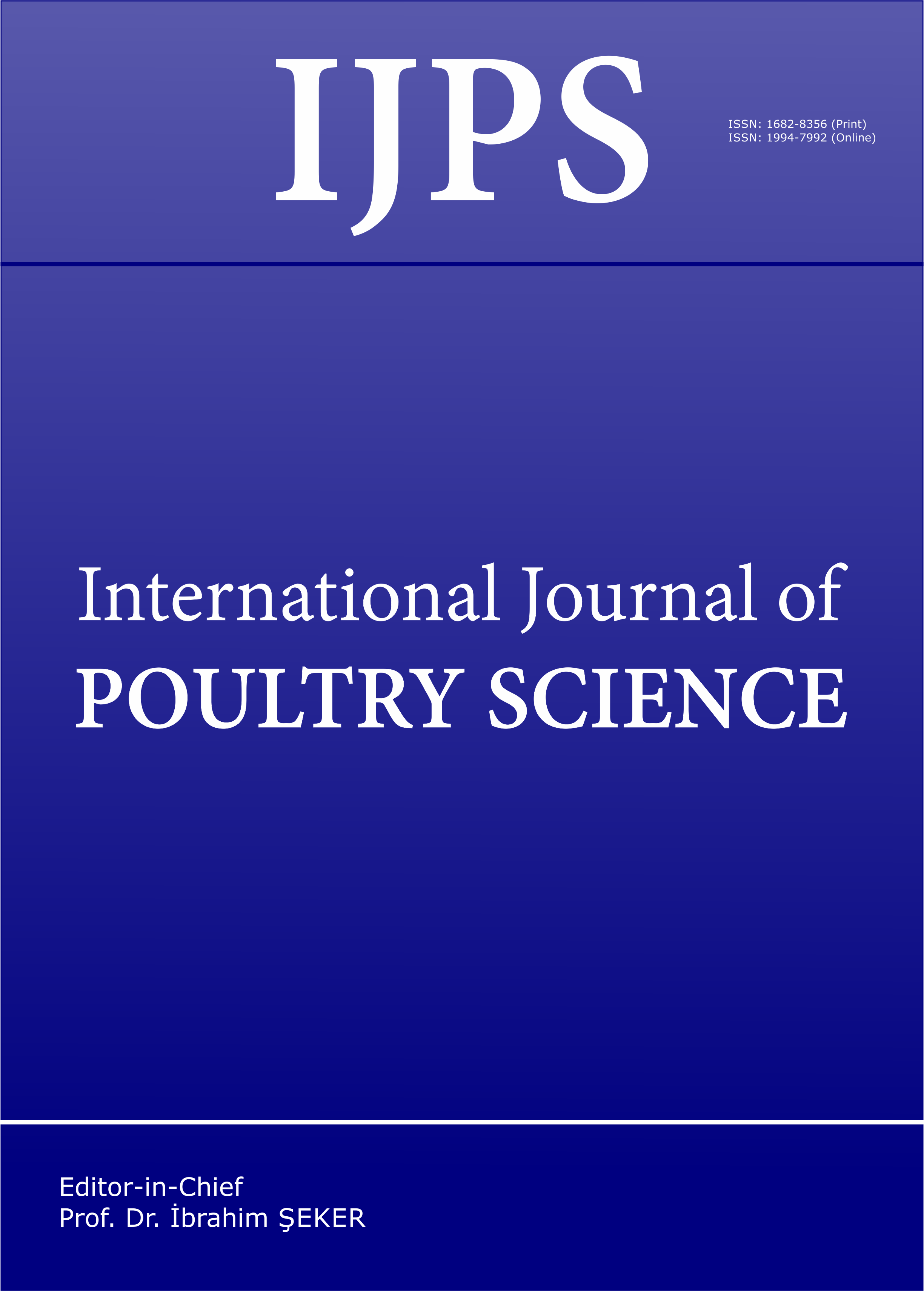The Potential of Acacia angustissima Leaf Meal as a Supplementary Feed Source in Broiler Finisher Diets
DOI:
https://doi.org/10.3923/ijps.2012.55.60Keywords:
Acacia angustissima, broiler, finisher diet, growth, leaf mealAbstract
This study evaluated, in a completely randomized design with five replicates, performance of Ross broiler chicks fed diets with 0 to 15% of Acacia angustissima leaf meal (leaf meal) from the fifth week to the end of the eight week of growth. Feed intake, weekly bodyweight, bodyweight gain, feed conversion ratio and carcass characteristics were determined. Feed intake, body weight gain and feed conversion ratio in birds on the 0% to 5% were not different (p<0.05). Broilers on 10% and 15% leaf meal had lower (p<0.05) bodyweight gain than those on the 0% and 5% leaf meal. However, birds on the 10% and 15% leaf consistently gained bodyweight and did not show any abnormalities or signs of disease. It is concluded that up to 15% leaf meal can be included in broiler finisher diets; however, 5% leaf meal appears to be the optimum inclusion rate for normal growth.
References
Al-Mamary, M., A. Molham, A. Abdulwali and A. Al-Obeide, 2001. In vivo effect of dietary sorghum tannins on rabbits digestive enzyme and mineral absorption. Nutr. Res., 21: 1393-1401.
D'Mello, J.P.E., T. Acamovic and A.G. Walker, 1987. Evaluation of leucaena leaf meal for broiler growth and pigmentation. J. Trop. Agric., 64: 33-35.
D'Mello, J.P.F., 1995. Leguminous Leaf Meal in Non-Ruminant Nutrition. In: Tropical Legumes in Animal Nutrition, D'Mello, J.P.F. and C. Devendra (Eds)., CAB. International, London.
D'Mello, J.P.F., 1992. Chemical constraints to the use of tropical legumes in animal nutrition. Anim. Feed Sci. Technol., 38: 237-261.
Dzowela, B.H., 1994. Acacia angustissima a central American tree that's going places. Agroforestry Today, 6: 13-14.
Guodao, L. and W. Dongjing, 1998. Preliminary Study of Leucaena leucocephala as Feed for Livestock. In: Leucaena Adaptation Quality and Farming Systems, Shelton, H.M., R.C. Gutteridge, B.F. Mullen and R.A. Bray (Eds.). Australian Centre for International Agricultural Research, Australia, pp: 284-285.
Gous, R.M., G.C. Emmans, L.A. Broadbent and C. Fisher, 1990. Nutritional effects on the growth and fatness of broilers. Br. Poult. Sci., 31: 495-505.
Hien, T.Q. and N.D. Hung, 1998. The effect of Leucaena leaf meal on egg quality and growth of broiler chickens. Proceedings of the Workshop on Leuceana-Adaptation, Quality and Farming System, February 9-14, 1998, Hanoi, Vietnam, pp: 296-297.
Hien, T.Q. and N.T. Inh, 1998. The effect of supplementing the diet of broiler chickens with Leucaena leaf meal and FeSO4. Proceedings of the Workshop on Leuceana-Adaptation, Quality and Farming System, February 9-14, 1998, Hanoi, Vietnam, pp: 298-299.
Ige, A.O., A.A. Odunsi, J.A. Akinlade, L.O. Ojedapo, S.A. Ameen, O.A. Aderinola and T.A. Rafiu, 2006. Gliricidia leafmeal in layer’s diet: Effect on performance, nutrient digestibility and economy of production. J. Anim. Vet. Adv., 5: 483-486.
Iyayi, E.A. and F.K. Fayoyi, 2005. Effects of feeding cassava fruit coat meal on the nutrient digestibility and performance of broilers. Livestock Res. Rural Dev., Vol. 17.
Mashamaite, L., J.W. Ngambi, D. Norris, L.R. Ndlovu and C.A. Mbajiorgu, 2009. Relationship between tannin contents and short-term biological responses in male rabbits supplemented with leaves of different acacia tree species grown in Limpopo province of South Africa. Livestock Res. Rural Dev., Vol. 21.
Maasdorp, B., 2004. Which Trees?. In: Growing Trees for Profitable Milk Production: A Manual for Farmers and Extension Staff, Hove, L. (Ed.). World Agroforestry Center (ICRAF), Kenya.
McNabb, W.C., J. Peters, L.Y.S. Foo, G.C. Waghorn and F.S. Jackson, 1998. Effect of condensed tannins prepared from several forages on the in vitro precipitation of ribulose 1.5 biosphophate caboxylase (rubisco) protein and its digestion by trypsin (EC 2.4.21.4) and chymotrypsin (EC2.4.21.1). J. Sci. Agric., 77: 201-212.
Mutayoba, S.K., E. Dierenfeld, V.A. Mercedes, Y. Frances and C.D. Knight, 2011. Determination of chemical composition and ant-nutritive components for tanzanian locally available poultry feed ingredients. Int. J. Poult. Sci., 10: 350-357.
Odenyo, A.A., P.O. Osuji, J.D. Reed, A.H. Smith, R.I. Mackie, C.S. McSweeney and J. Hanson, 2003. Acacia angustissima: Its anti-nutrients constituents, toxicity and possible mechanisms to alleviate the toxicity-a short review. Agroforestry Syst., 59: 141-147.
Preece, D. and R. Brook, 1999. Acacia angustissima - A Promising Species for Agroforestry?. In: FACT Sheet 99-01, A Quick Guide to Multipurpose Trees from Around the World, Winrock International, Arkansas, USA.
Raharjo, Y.C., P.R. Cheeke, O.N.N.M. Patt and K. Supriyati, 1986. Evaluation of tropical forages and by-product feeds for rabbit production. I. Nutrient digestibility and effect of heat treatment. J. Applied Rabbit Res., 9: 56-66.
Sarker, S.C., J. Abedin and S.M.F. Islam, 1999. The performance of commercial poultry farms: A profitability and efficiency analysis. Bangladesh J. Agric. Econ., 22: 63-75.
SAS, 2000. Propriety Software Release 8.1. Statistical Analysis Systems Institute Inc., Cary, North Carolina, USA.
Smith, A.H., M.A. Wallig, D.S. Seiglerd, A.A. Odenyo, C.S. McSweeney and R.I. Mackie, 2003. Ameliorating toxic effects of Acacia angustissima with polyethylene glycol in rats. Anim. Feed Sci. Technol., 106: 165-174.
Downloads
Published
Issue
Section
License
Copyright (c) 2012 Asian Network for Scientific Information

This work is licensed under a Creative Commons Attribution 4.0 International License.
This is an open access article distributed under the terms of the Creative Commons Attribution License, which permits unrestricted use, distribution and reproduction in any medium, provided the original author and source are credited.

